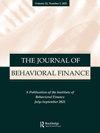纠正还是不纠正:投资者能够辨别虚假金融新闻吗?
IF 1.7
3区 经济学
Q3 BUSINESS, FINANCE
引用次数: 0
摘要
摘要本研究试图了解如何减少误导性财经新闻的持续影响,并检验纠正措施的有效性,如事前披露发起人/作者的薪酬和事后纠正的即时性。在2(披露vs.未披露)× 2(即时更正vs.延迟更正)实验中,学生参与者收到一篇(假)新闻文章,包括或不包括作者的隶属关系和补偿方案,然后提供更正,使其内容无效。更正要么立即提供,要么延迟提供。结果显示,尽管参与者容易受到正面但具有误导性的新闻的影响,但提供有关潜在经济利益冲突的警告似乎可以缓和投资者的这种热情。当最初的新闻文章包含薪酬披露时,以及当他们没有立即被提示处理更正时,参与者对明确的更正表现出更大的接受度。我们的研究结果表明,延迟修正可能具有明显的优势,因为它为投资者提供了随着时间的推移将薪酬披露信息吸收到其投资决策中的机会。此外,我们的研究结果表明,涉及利益冲突披露和随后的纠正的双重方法可以成为减轻投资者对错误信息脆弱性的有效长期策略。关键词:纠正措施;虚假新闻;投资者判断;错误信息确认作者感谢德保罗大学会计研究研讨会上与会者的建议。作者也要感谢德保罗大学的财政支持。披露声明作者未报告潜在的利益冲突。注1在实验中,我们没有指定新闻文章的真实程度,认为任何对正面新闻的反应都会满足假新闻的下界。在一项初步研究中,我们为一组参与者提供了金融亮点和虚假(乐观)新闻文章,而另一组只提供了金融亮点。我们比较了这两组人的判断,并将两种情况之间的差异归因于假新闻。我们发现,财务亮点+乐观消息条件下的判断远高于仅财务亮点条件下的判断。这一证据表明,乐观的新闻文章确实夸大了投资者的投资判断我们在ANOVA分析中引入了三个人口统计变量——工作经验、投资经验和年龄作为协变量。这些变量都没有统计学意义。重要的是,纳入这些协变量并没有改变我们的ANOVA分析的结果双侧p = 0.14(见表5)本文章由计算机程序翻译,如有差异,请以英文原文为准。
To Correct or Not to Correct: Are Investors Able to Discern Fake Financial News?
AbstractThis study attempts to understand how to reduce the continued influence of misleading financial news and examine the effectiveness of corrective efforts such as ex-ante disclosure of compensation of a promoter/writer and the immediacy of ex-post correction. In the 2 (disclosure vs. no disclosure) × 2 (immediate correction vs. delayed correction) experiment, student participants received a (fake) news article including or excluding the author’s affiliation and compensation scheme and were then provided a correction invalidating its content. The correction was provided either immediately or with a delay. The results showed that although participants were susceptible to the influence of positive yet misleading news, providing warnings about potential economic conflicts of interest seemed to temper this enthusiasm among investors. Participants exhibited greater receptiveness to explicit corrections when the initial news article included a compensation disclosure, and when they were not immediately prompted to process the correction. Our findings imply that delaying corrections may offer distinct advantages, as it provides investors with the opportunity to assimilate the compensation disclosure information into their investment decisions over time. Additionally, our results indicate that a dual approach involving conflict of interest disclosure and subsequent correction can be an effective long-term strategy in mitigating investors’ vulnerability to misinformation.Keywords: Corrective measuresFake newsInvestor judgmentsMisinformation AcknowledgementThe authors are thankful for the participants’ suggestions at the accounting research workshop at DePaul University. The authors would also like to thank DePaul University for the financial support.Disclosure statementNo potential conflict of interest was reported by the authors.Notes1 In the experiment, we did not specify the degree of truthfulness of the news article and believed that any reaction to positive news would satisfy the lower bound of fake news. In a pilot study, we provided one group of participants with the financial highlights plus the fake (optimistic) news article and the other group with only the financial highlights. We compared the judgments from these two groups and attributed any difference between the two conditions to fake news. We found that judgments from the financial highlights + optimistic news condition are much higher than those from the financial highlights-only condition. This evidence indicates that the optimistic news article indeed inflated investors’ investment judgments.2 We introduced three demographic variables—working experience, investment experience, and age—as covariates in our ANOVA analysis. None of these variables yielded statistical significance. Importantly, the inclusion of these covariates did not alter the outcomes or results of our ANOVA analysis.3 Two sided p = 0.14 (see Table 5)
求助全文
通过发布文献求助,成功后即可免费获取论文全文。
去求助
来源期刊

Journal of Behavioral Finance
Multiple-
CiteScore
4.60
自引率
10.50%
发文量
34
期刊介绍:
In Journal of Behavioral Finance , leaders in many fields are brought together to address the implications of current work on individual and group emotion, cognition, and action for the behavior of investment markets. They include specialists in personality, social, and clinical psychology; psychiatry; organizational behavior; accounting; marketing; sociology; anthropology; behavioral economics; finance; and the multidisciplinary study of judgment and decision making. The journal will foster debate among groups who have keen insights into the behavioral patterns of markets but have not historically published in the more traditional financial and economic journals. Further, it will stimulate new interdisciplinary research and theory that will build a body of knowledge about the psychological influences on investment market fluctuations. The most obvious benefit will be a new understanding of investment markets that can greatly improve investment decision making. Another benefit will be the opportunity for behavioral scientists to expand the scope of their studies via the use of the enormous databases that document behavior in investment markets.
 求助内容:
求助内容: 应助结果提醒方式:
应助结果提醒方式:


